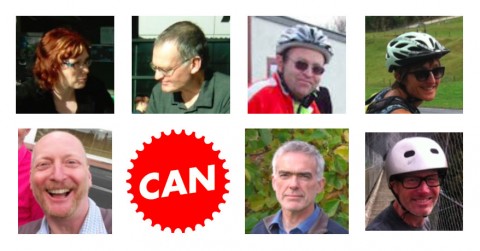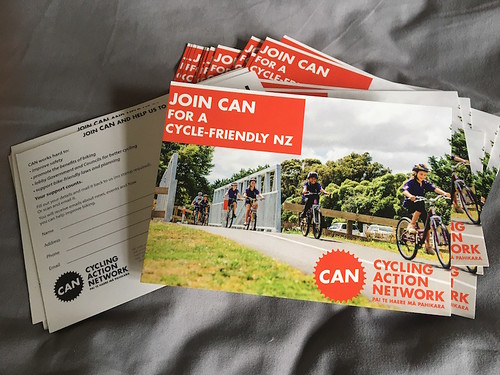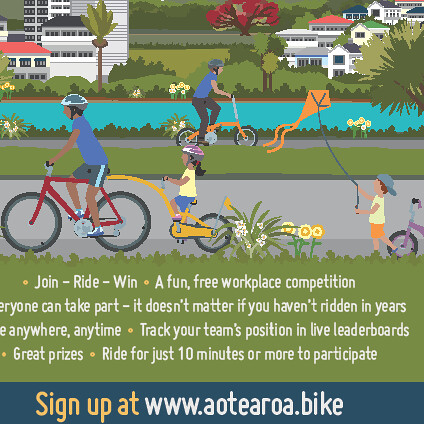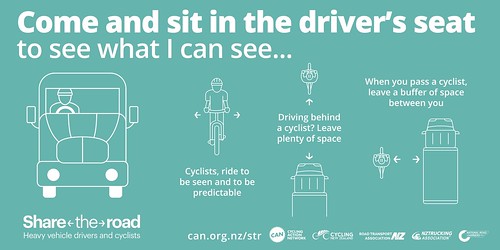
Chair’s Report 2016 to 17
This is the report a summary of which was approved by CAN's 2017 AGM. The new Governance system of CAN and the new fee subscription system were also approved at the AGM, so some parts of this report were superseded then.
Summary
This report summarises the activities of CAN’s central Committee, paid staff and national-body volunteers since the 2016 AGM in Hamilton. ‘Headline’ issues included-
- Reacting to changes in regulations and NZTA’s push to grow cycling were a main part of CAN’s core business.
- Preparations for elections in September were an important forward step with political engagement off to a good start.
- Creating the new Structure for CAN including holding the SGM affected work on some of CAN’S core activities.
Network and Public Engagement
Our Project Manager and spokesperson Patrick Morgan is a contact point for groups and members of the Network. In 2016-17 for example he helped with the Future of biking in Palmy meeting in Palmerston North in October, continued working with his local group Cycle Aware Wellington, and helped develop a bike security campaign for Auckland, Wellington and Christchurch.
Alastair Smith organised successful webinars for Network members, covering such topics as talking to political representatives and bike parking.
On the wider front Patrick has been relentless in pursuing cycling stories -particularly the good-news ones- through the media, appearing regularly on Radio NZ, acting more and more often as the go-to source for many journalists round the country when they hit on a cycling story, and generally building his and CAN’s presence and profile. Patrick issues press releases frequently through the year.
Patrick also manages social media: Facebook helps Network members share information and experiences, and Twitter lets CAN get views out to an external audience.
Political and Stakeholder Engagement
Members workshopped CAN’s priorities at the 2016 AGM. Committee reflected on and discussed this input at length, in view of the re-structure and changing national policy situation.
This, combined with preparatory work for the September elections, led to the production of a new Political Engagement strategy by Jo Mackay and Patrick Morgan which puts the views of CAN along with supporting evidence in a form easily read by policy makers and the public.
2Walk&Cycle conference is a key plank of the Network’s engagement with cycling groups and the wider transport sector. CAN is indebted to those on the hard-working committee. July’s very successful edition in Auckland featuring Gil Penalosa was generously assisted by the NZTA who supported and ran the Bike to the Future awards. Other sponsors including Auckland Transport, Beca and MWH deserve our gratitude.
NZTA: Of course the major stakeholder in NZ transport is the NZTA. CAN met the Agency’s incoming CEO, Fergus Gammie, last May and found him to be forward-thinking and receptive.
The Agency continued this year to make significant strides forward in the promotion of cycling for transport. The Urban Cycleway Programme, now showing an overall budget approaching $400 million, is only part of the Agency’s Cycling Team’s remit: behaviour change, research into regulations, and even a TV ad showing how exciting cycling can be for commuters were all positive developments seen this year. While keeping a close eye on activity of the NZTA as a whole, the Committee does see the Cycling Team’s work as very positive and highly significant. CAN looks forward to continuing a close and supportive relationship with NZTA through the Agency’s own upcoming re-structure.
Further work with NZTA involved collaboration on new studies into cycle skills education (Patrick Morgan representing the Network here) which NZTA wants to improve and standardise, and on their complex and technical Speed Management Guideline documentation for Councils, which proposes national standardisation for speed limits.
Ministry of Transport: Engagement with the Ministry continued, both in the form of quarterly meetings with Ministry, NZTA and Living Streets Aotearoa and through other channels: meetings with both Minister Bridges and Associate Minister Bennett were held; Patrick Morgan and Jo Mackay put CAN’s views to both Ministers and helped outline what cycling in NZ needs to grow. The Committee is glad to see the continued interest Minister Bridges demonstrates in increasing cycling numbers and hopes that any successor will match his contribution.
Ministry engagement also took place during stakeholder consultation in the drafting of the Government Policy Statement on land transport, which sets out Government’s vision for land transport up until 2028 and is revised every three years.
The Ministry’s Vehicle Technologies and Standards documents came up for regular review, and CAN gave input on new technologies available for bikes, as well as suggesting improvements for other vehicles such as side under-run protection and blind-zone amelioration for heavy vehicles.
Several rule changes on road transport were enacted by the Minister in omnibus form in November, including revisions to bike light specifications.
Other engagement:
Other stakeholders engaged with were ‘Bikes Welcome’ initiative of Jo Clendon; Skypath activists; the Revolution Bike Show proposed for this year (now postponed); NZ College of Public Health Medicine in the person of Jane Dancer; Police; Sustainable Business Network; Brake NZ; the Bicycle Industry Association of NZ and Bike Challenge Aotearoa. That’s of course just to include those contacted by Committee, staff and volunteers directly and not including the many many contacts through the year by Network Groups.
Our close relationship with Living Streets Aotearoa continues despite different approaches to footpath cycling.
Staffing and Committee
Patrick Morgan is now the sole directly-employed CAN staff member.
Committee continued to administer employee, Health & Safety, insurance, Charities Office, Revenue and other tasks.
CAN’s communications offered challenges with an expensive up-date to our website’s deprecated software, and a drop in available resources for producing e.CAN and Chainlinks. Adrian Croucher bowed out of e.CAN production last month after single-handedly producing a remarkable 220 issues, and Dr. Croucher continues as our Membership Secretary.
However a new communications strategy has been set out, with much work from Committee member Claire Sherrington, allowing the incoming Executive to make clear decisions on the Network’s audiences, messages and channels of communication. And ultimately the website costs have proved worthwhile, with a smoother and more attractive interface the end result. This is thanks to Claire, Stephen on Committee as well as both our software consultants Fuzion and web designers Upshift (Upshift provided considerable pro bono consultation).
The ongoing re-structure of CAN overshadowed much of the year’s work. Committee members Don, Graeme, Claire and others have been working hard to see that the Network functions well into the future, setting out the new constitution, defining role responsibilities for Board and Executive members, and seeking nominations. The special general meeting in September set much of the framework in place and confirmed the support of Members for the changes outlined by Committee.
Projects and Policy
CAN has a suite of policies setting out what we reckon will best get more people on bikes more often. These are set through a formalised process, involving agreement among Committee and consultation with Members. 2016-17 was a busy year for policy.
Relaxing rules on footpath cycling to allow under-14s do so was mooted in public. An extensive survey of Network members indicated that there were strong feelings both for and against any relaxation of rules, and that CAN’s draft policy calling for under-12s to be permitted was generally supported.
Another issue testing robustness of policies was the huge growth in electric bike use; CAN took part in research into how e-bikes, electric scooters and other low-powered transport devices should be managed or regulated.
Research papers issued by NZTA on both the above policy issues, on possible regulation of overtaking gaps, and on road rule changes around intersections raise issues that CAN must closely monitor in coming months.
Work continued on the Share the Road Campaign project in contract with NZTA CAN’s Project Manager Richard Barter. The purpose of the campaign is to address the lack of understanding and awareness among people on bikes and drivers of heavy vehicles as to the issues involving the safety of those who cycle around heavy vehicles. The campaign will provide these groups with clear guidance on sharing the road in a manner that is respectful of their individual needs. The Campaign goal is “making safer roads for heavy vehicle drivers & bicycle users”.
An incredible number of workshops and demonstrations were organised and undertaken throughout New Zealand over the 3 years and the project continues to meet or exceed its contracted goals, on time and within budget.
Richard continued doing an excellent job of getting alongside the heavy vehicle industry and developing the workshops to meet their requirements. This was recognised by the NZ Traffic Institute who conferred a Leadership Award on Richard in November. CAN’s chair Will was contracted to help Richard on a part-time basis; Will will now step down from CAN roles that involve decisions around the Campaign or related finances.
Looking forward to 2017-18
2017’s AGM will finalise the shape of the new CAN. The calibre of nominees to the new Board is high. Separating governance and management will make for a more efficient decision-making structure, and new leaders are bringing fresh skills and energy, which all bodes well for a resurgence in cycling advocacy on the national stage.
The September national elections offer an opportunity for CAN to draw all political parties’ attention to CAN’s aims and encourage them to adopt pro-cycling policies.
The NZTA research mentioned above -particularly where it affects mandatory overtaking gaps for cyclists- will need close monitoring.
In October, the Asia-Pacific Cycle Conference will bring us together with overseas colleagues and experts, allowing us to compare what’s been achieved here in NZ with accomplishments in the broader region.
Thanks
- Some would say the real work of CAN gets done by local groups in endless meetings with Councils, site visits, painstaking analysis of parking spaces and tireless volunteering for bike breakfasts, festivals and training events. Each local volunteer merits our gratitude. As a Network and a team we are all moving things forward no matter how small the task accomplished.
- Don Babe is stepping down after several hard working years as redoubtable, dependable and decisive Treasurer. CAN was greatly strengthened by his input, hard work and guidance.
- Dr. Adrian Croucher compiled, edited and issued 220 issues of e.CAN and is stepping down from that role now. Adrian continues to operate our Membership database -a critical role- with aplomb and professionalism.
- Elaine Richardson tirelessly helps with our accountancy, Xero administration and processing of payments in and out.
- Jane Dawson liaises with the 2Walk&Cycle Conference organisers, keeps an eye on policy, and engages for CAN with NZTA and other national bodies.
- Alastair Smith, Jo Mackay and the hard-working committee from CAW have made an outstanding job of this year’s CAN-Do. Thank you.
Committee 2016-17
- Don Babe (Treasurer)
- Graeme Lindup (Ex-Chair supporting current chair)
- Jo Mackay
- Claire Sherrington
- Paul Shortland
- Rex Williams (co-opted in January)
- Stephen Wood (Secretary, supported by Richard Barter)
- Will Andrews (chair)
2017- March 12th



